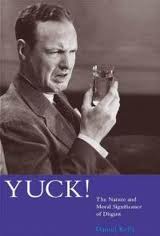Disgusting Morals
Adams, W. A. (2012). True or False: Incest is Disgusting, Therefore Immoral. [Review of the book, Yuck! The Nature of Disgust and its Moral Significance]. PsycCRITIQUES – Contemporary Psychology: APA Review of Books, January 18, 2012 (57) Release 3, Article 3.
People often call certain acts “unnatural,” and they mean to say immoral. The logic is that if a practice goes against nature, it is not only disgusting, but wrong. Does that make sense? Or is disgust, like any emotion, irrelevant to rational judgment? Shouldn’t what’s right and wrong be determined by rational consideration of values and traditions, not by a knee-jerk emotional reaction to what’s disgusting?
The common-sense formula seems to be, “Activity X is disgusting, therefore it is immoral.” For clarification, substitute the following practices for X: cigarette smoking, sodomy, human sacrifice, same-sex marriage, taxing the poor, worshiping false gods. Is the common-sense formula valid? No. It’s an error in reasoning called the naturalistic fallacy. That fallacy argues that whatever happens in nature is good, and whatever goes against nature is bad. But who says so? There is no justification for that belief.
Philosopher Daniel Kelly offers a plausible account of what disgust is and an original proposal of its relationship to morality. The involuntary disgust reaction and its recognizable facial expression evolved, he says, for our prehistoric ancestors to identify and signal poisonous food and disease-causing situations.When you see someone react to something like the fellow pictured on the cover of the book, you are supposed to understand that what he’s reacting to is probably poisonous or disease-causing. (Although the picture leaves out an important element of the disgust reaction, the tongue sticking out of the mouth, so technically, the guy could be angry rather than disgusted. It’s an odd error for the publisher to make).
Today though, the disgust reaction has been recruited into service of social, moral, religious, and other judgments, so a person might have a visceral disgust reaction to a member of an ethnic out-group, even though that other person is neither poisonous nor parasitic. Actual disgust, once a warning against poison and disease, has become metaphorical social disgust.
But unlike biological poisoning, social values are arbitrary, based on a group’s transient beliefs, so disgust about certain social practices should have no influence on moral judgment. There’s no connection between biology and morality. Surprisingly though, author Kelly backs away from that conclusion, suggesting that even today, a disgust reaction to a social practice is a warning to others that it is dangerous and wrong. Why does he leave his conclusion hanging ambivalently like that? My guess is that he sniffed the disgusting odor of the naturalistic fallacy, but wanted to keep his conclusion anyway.

